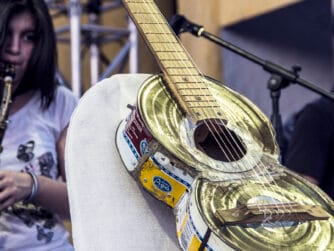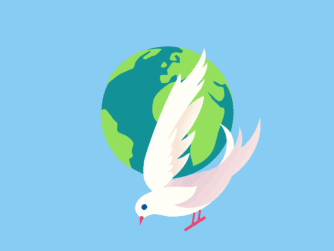Voice 1
Welcome to Spotlight. I’m Ryan Geerstma.
Voice 2
And I’m Marina Santee. Spotlight uses a special English method of broadcasting. It is easier for people to understand, no matter where in the world they live.
Click here to follow along with this program on YouTube.
Voice 1
In June of 2011, Megan Cox Gurdon wrote a story for the Wall Street Journal news organization. Gurdon believes that young adult, English literature is getting darker. She believes that it is often too serious or intense for young adults. In the story she wrote,
Voice 3
“An unknowing young reader – or one who seeks out evil – will find himself surrounded by images not of joy or beauty. Instead, he finds damage, violence and loss of the worst kinds.”
Voice 2
Writer Libby Bray does not agree. After reading Gurdon’s story, she wrote this on the Internet service Twitter,
Voice 4
“Books are dangerous. Yes, dangerous. They test our ideas and our blindness. They open us to new ideas, new ways of seeing. They make us hurt in all the right ways. They can push down barriers… And when a person feels alone …books can heal and connect. That is what good books do. That is what difficult books do. And we need them in the world.”
Voice 1
Can a book about hurtful things still be good? Is it ever good to ban a book? What about when the reader is young? Today’s Spotlight is on the complex issue of book banning.
Voice 2
Book banning has a long history. Many cultures over time have banned books for many reasons. One of the earliest known examples is the banning of Homer’s famous book The Odyseey. In the year 387 BCE, the ancient Greek thinker Plato wrote that The Odyssey should be kept away from young adults. Plato thought it contained examples of bad behaviour that children might follow.
Voice 1
At other times, religious leaders have banned books for expressing ideas that are against religion. For example, n they ear 1520, the Catholic Church banned the writings of the religious leader Martin Luther. The Pope did not agree with Luther’s ideas, and he banned both Luther and his writing from the church.
Voice 2
Other times, governments have banned books that communicate a political message they do not agree with. In the 1970’s, Eduardo Galeano wrote a book about the history of South America. It is called The Open Veins of Latin America. In 1973, the military took control of the government in Galeano’s home country, Uruguay. After this, the government banned his book. And Galeano was forced to leave the country.
Voice 1
Galeano and many writers in Uruguay were threatened with death if they did not write what the government liked. He believes that being able to talk about the government is important for making people think. Galeano told the magazine In These Times:
Voice 5
“We had to choose between silence and shame. We could stay alive if we lied, or we could be quiet…We decided to be completely quiet and show that we were not free…Many writers died or disappeared or went to prison or went into exile…We showed that it was possible to have a different idea of culture.”
Voice 2
Galeano thought all people should have the freedom to speak truth. He also thought people should have the freedom to question authority.
Voice 1
However, sometimes it is not political or religious leaders that want to ban books. Sometimes, it is just parents, teachers or local officials. And they want to ban books because they think particular books are dangerous for children. In 1818, Thomas Bowdler printed a ‘family version’ of William Shakespear’s most famous plays. Bowdler removed parts of the plays that he thought were too shocking for families with young children to read. Much like Plato, in ancient times, Bowdler wanted to protect children and young adults. And today, many parents, teachers and local officials still struggle with the issue of book banning.
Voice 2
In the past 75 years, more and more English writers have begun to write literature particularly for young adults. These stories are not children’s stories. Instead, they are long and complex stories written for young adults – between the ages of 10 and 18 years old. The characters in young adult literature are often young adults. And the books are often about things that affect the lives of the 10 to 18 year olds. Many times, the stories are set in schools or homes – similar to the real life of the reader.
Voice 1
Like in literature for adults, young adult books often discuss hard things. The stories can include drugs, sex, and violence, or bad language and bad behaviour. Some parents do not like their children reading about these hard issues. So, often, parents, teachers and government officials decide what is good for children to read.
Voice 2
Megan Cox Gurdon, the writer from the beginning of this program, believes that banning some books from young adults may be a good idea. She worries particularly when young adults read literature about self-harming behaviour – like drinking too much alcohol or cutting yourself to deal with strong emotions. She worries that if young adults read too much about these behaviours, they may start to think the behaviours are normal.
Voice 1
However, many writers do not like the idea of banning books. Writers write books so that people will read them! Often, writers of young adult literature write about hard issues because young adults experience these hard issues. They hope that their books will help young adults struggling with hard issues. They hope their books will help young readers feel like they are not alone. However, when young adult books are banned, young adults do not get to read the writer’s words. This also means that a young adult cannot learn from that book.
Voice 2
Maureen Johnson writes young adult literature. In 2007, one of her books was banned in Bartelsville, Oklahoma, the United States. Johnson has very strong opinions on book banning. She believes that it is important for young adults to read books about difficult issues. She thinks that this is one way for people to learn about the world around them. Johnson wrote about book banning on her website:
Voice 6
“We need education… The world is getting more connected and wonderful. And banning books is just not going to work… fear of everything is not a good way to live. Instead of banning books, we should be working together toward new ways of saving the planet.”
Voice 1
What do you think about banning books? Is it ever good to ban books? Who do you think should decide what young adults read? You can email us your thoughts at radio@radioenglish.net. Or you can leave a comment on the script page of the program on our website.
Voice 2
The writer and producer of this program was Dianna Anderson. The voices you heard were from the United Sates and the United Kingdom. All quotes were adapted for this program and voiced by Spotlight. You can listen to this program again, and read it at the same time on our website at www.radioenglish.net. This program is called, ‘Dangerous Books’. The website also has many other Spotlight programs, our word list, more information, and comments from other listeners. You can also find Spotlight on Facebook and Twitter – just search for spotlightradio.
Voice 1
We hope you can join us again for the next Spotlight program. Goodbye.
Question:
What do you think about banning books? Is it ever good to ban books? Who do you think should decide what young adults read?








To ban or not to ban, that is not the question. The ban serves to increase curiosity and interest, but young people are above all interested in knowing whether they are loved or not. It goes without saying that there are books that make us feel good and improve us and there are rubbish books that harm us. I believe that young people are willing to discuss everything, even books, with those who have already shown them that they love them and would like to do everything to avoid them unnecessary suffering. Another issue is freedom of the press in a democratic state, where the press has the task of controlling power, of preventing its degeneration. Among the duties of a democratic state there is certainly that of guaranteeing the best possible skills to citizens, but it should never think of educating them. Within certain limits, this can be the parents’ task, but parents cannot even consider their child an object to be shaped according to their desires. Children are children of life, they are not the property of their parents.
no i don’t do.i think puplis should read book for many reasins one of this reasins to have a new ways of saing.
no baing book die creativiti for often pupils
youn adult shout all the type of book
dangerous book is a beautiful book for my opinoin and this type of book means a lot for learned english
I think banning books is a good idea. especially bad books and adult pornography, unholy stories for children and adults.I think children should read imaginary stories and stories told by animals to improve their thinking and stay away from stories of murder and bloodshed , but adults should read books with a lot of information.
I want to learn
Me to
good
Hello,
In all honestly, I consider that should be some limitations, they must be classified by ages, not all contents are appropriate for everybody.
Reading is one of the most interesting hobbies in the world, it has multiple benefits, we need to now what to read in each age.
I think goverments, teachers, parents should explain why or why not someone should or shouldn’t read certain kind of books depending on the age.